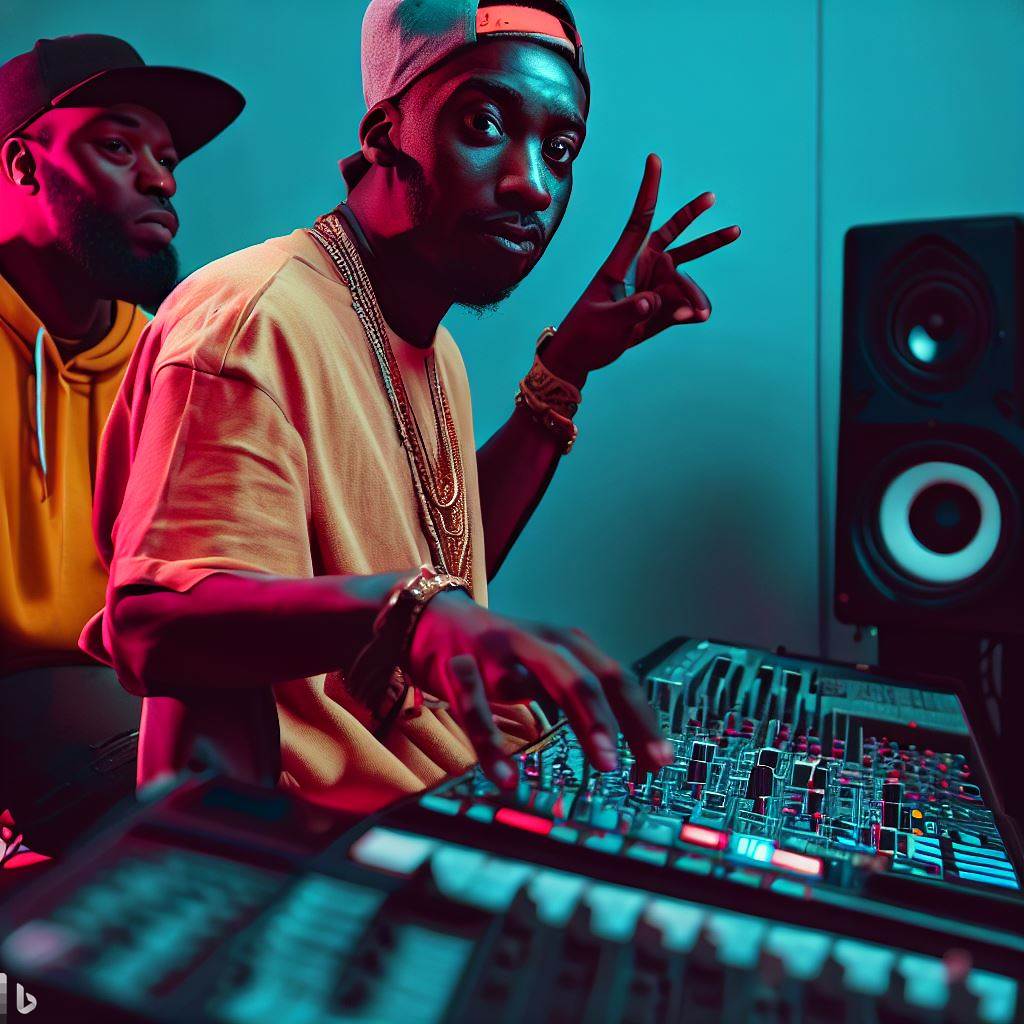Introduction
In Nigeria, the sound editing industry has witnessed remarkable growth over the years.
It has become a vital component of Nigeria’s thriving entertainment sector, contributing to the success of movies, radio dramas, and music productions.
The art of sound editing in Nigeria relies on striking a delicate balance between artistic expression and technical proficiency.
This balance is crucial in delivering high-quality sound experiences that captivate audiences and enhance storytelling.
The purpose of this blog post is to explore the significance of maintaining a harmonious relationship between art and technology in Nigerian sound editing.
It will delve into the challenges faced by sound editors in achieving this balance and highlight strategies to overcome them.
History of Nigerian Sound Editing
A. Early development of sound editing in Nigerian films
Sound editing in Nigerian films has come a long way since its early development.
During the early years of Nigerian cinema, sound editing was a rudimentary process.
Sound effects were either recorded live on set or added during post-production using basic techniques.
This resulted in poor sound quality and limited creativity in terms of sound design.
However, as the Nigerian film industry began to grow and gain international recognition, sound editing techniques also started to evolve.
Filmmakers realized the importance of sound in enhancing the overall cinematic experience
and started investing in better sound equipment and techniques.
B. Influence of traditional Nigerian music on sound editing
Traditional Nigerian music has had a significant influence on sound editing in Nigerian films.
- Nigerian filmmakers incorporate elements of traditional music into their sound design to create a uniquely Nigerian cinematic experience.
- The rhythms, melodies, and instrumentation of traditional music are often used to enhance the storytelling and capture the cultural essence of the film.
- This blending of traditional music with modern sound editing techniques has helped create a distinct Nigerian sound that sets Nigerian films apart from others in the industry.
- It not only adds authenticity to the storytelling but also appeals to both local and international audiences.
C. Technological advancements in sound editing tools
Technological advancements have played a crucial role in shaping the landscape of sound editing in Nigerian films.
In the past, Nigerian filmmakers had limited access to professional sound editing tools and equipment.
However, with the advent of digital technology, the accessibility and affordability of sound editing tools have significantly improved.
This has allowed Nigerian sound editors to experiment more creatively with sound design, resulting in higher-quality soundtracks and a more immersive cinematic experience.
Furthermore, the integration of art and technology has opened new possibilities for Nigerian sound editors to push the boundaries of their creativity.
They can now explore a wide range of sound effects and techniques to enhance the emotional impact of a scene and create a more engaging audio experience for the audience.
The history of sound editing in Nigerian cinema is a testament to the continuous evolution and growth of the Nigerian film industry as a whole.
From its early rudimentary stages to the integration of traditional music and the advancements in sound editing technology,
Nigerian sound editing has come a long way in balancing art and technology.
With each new film, Nigerian sound editors continue to push boundaries and create innovative soundscapes
that captivate audiences both locally and internationally.
As the Nigerian film industry continues to expand, it is important to recognize the crucial role that sound editing plays in enhancing the overall cinematic experience.
By striking a balance between art and technology, Nigerian sound editors can create soundtracks that not only complement the visuals but also add depth and emotion to storytelling.
It is an exciting time for Nigerian sound editing, and we can only expect further growth and innovation in this field in the years to come.
Read: Training Institutes for Sound Editors in Nigeria
The Art of Sound Editing in Nigerian Films
A. Emotional impact of sound editing on storytelling
Sound effects, music, and dialogue enhance the emotional impact of Nigerian films.
- The right combination of sound elements can heighten tension, evoke fear, or stir up excitement.
- Emotional cues, such as ambient sounds, help the audience connect with the characters’ emotions.
- Sound editing enables the manipulation of sound to create emotional responses from viewers.
B. Role of sound editing in creating a sense of realism
Sound editing plays a crucial role in creating a realistic atmosphere in Nigerian films.
- Background sounds and incidental noises contribute to the authenticity of each scene.
- Well-executed sound editing can transport the audience into the world of the film.
- By adding realistic sounds, sound editors make Nigerian films more immersive and believable.
C. Sound design as a creative expression
In Nigerian sound editing, sound design stands as a distinctive avenue for creative expression.
- Sound editors possess the ability to craft soundscapes that enhance visual storytelling.
- Sound design adds depth and texture to the film’s narrative, allowing for a more engaging experience.
- Through sound design, sound editors can portray emotions, themes, and even cultural aspects.
In fact, sound editing plays a vital role in Nigerian films, balancing art and technology.
The emotional impact of sound editing on storytelling is evident in the way it enhances the audience’s connection with the characters and their emotions.
Additionally, sound editing contributes to the creation of a sense of realism by incorporating background sounds and incidental noises.
Moreover, sound design serves as a creative expression, allowing sound editors to craft unique soundscapes that enrich the visual storytelling experience.
In Nigerian films, sound editing is both an art form and a technological achievement, further highlighting the importance of this aspect in the overall cinematic production.
Read: Legal Considerations for Nigerian Sound Editors
The Role of Technology in Nigerian Sound Editing
The role of technology in Nigerian sound editing cannot be underestimated.
A. Advantages of using modern sound editing software
Modern sound editing software brings numerous advantages to the process, enhancing not only efficiency and speed but also the overall quality of the final product.
With these tools, sound editors can fine-tune audio elements with precision and explore a vast array of creative sound effects and enhancements.
These advantages include:
- Enhances efficiency and speed of the sound editing process.
- Allows for precise manipulation and fine-tuning of audio elements.
- Enables a wide range of creative sound effects and audio enhancements.
- Facilitates seamless integration with other post-production software and equipment.
- Improves the overall quality and professionalism of the final sound product.
B. Integration of technology with traditional sound editing techniques
Moreover, the integration of technology with traditional sound editing techniques in Nigeria has immense benefits.
They include:
- Preserves and enhances the authenticity and cultural richness of Nigerian sound editing.
- Brings greater flexibility and experimentation to traditional sound editing processes.
- Empower sound editors to push creative boundaries and explore new artistic possibilities.
- Allows for the preservation and digitization of traditional sound archives.
- Fosters collaboration between sound editors, musicians, and other creative professionals.
C. Challenges faced in adopting new technologies
However, adopting new technologies in sound editing is not without challenges.
- The investment required to acquire and maintain modern software and equipment can be costly, posing financial hurdles for many sound editors.
- Additionally, there is a need for specialized training and skill development to effectively utilize the latest tools, which may not be readily accessible to all in Nigeria.
- Resistance to change and a reluctance to deviate from established traditional practices can also impede the widespread adoption of new technologies.
- Sound editors may be hesitant to let go of traditional methods and fear the loss of cultural authenticity.
- Moreover, limited access to technical support and resources can hinder the smooth integration of technology into Nigerian sound editing workflows.
- As technology continues to advance, there is also a risk of losing certain traditional sound editing techniques and expertise.
- While modern tools open up new possibilities, they may result in the gradual erosion of specific practices that hold cultural significance.
Thus, a balanced approach is essential, leveraging the advantages of technology while preserving and celebrating Nigeria’s unique sound editing heritage.
In essence, technology plays a crucial role in Nigerian sound editing, providing advantages such as efficiency, precision, and creative possibilities.
Integrating technology with traditional techniques strengthens the authenticity and flexibility of sound editing in Nigeria.
However, challenges related to cost, training, resistance to change, and limited resources need to be addressed to fully harness the potential of technology in this field.
Read: Challenges Faced by Sound Effects Editors in Nigeria

Balancing Art and Technology in Nigerian Sound Editing
A. Importance of maintaining the artistic integrity in sound editing
- Artistic integrity is crucial as it ensures that the sound editing aligns with the creative vision.
- Sound editors play a vital role in maintaining the authenticity and emotional impact of a film.
- By preserving the artistic intent, sound editors contribute to the overall artistic quality of the production.
- Artistic integrity enhances the audience’s engagement and enriches their viewing experience.
- Without maintaining artistic integrity, sound editing can become purely mechanical and lose its artistic essence.
B. Finding the right balance between creativity and technological advancements
- Creativity in sound editing allows for unique and innovative approaches to enhance the storytelling.
- Technological advancements provide sound editors with powerful tools and techniques for improved sound design.
- Striking the right balance ensures that creativity is not hindered by technological limitations.
- Embracing technological advancements enables sound editors to push boundaries and explore new possibilities.
- Creativity combined with technology maximizes the potential of sound editing to captivate the audience.
C. Collaboration between artists and technicians
- Collaboration between artists and technicians fosters a harmonious integration of artistic and technical elements.
- Artists provide the creative vision and guide the sound editors in achieving the desired artistic outcome.
- Technicians have the technical expertise to translate artistic ideas into tangible sound effects.
- Effective communication and mutual understanding are essential for a successful collaboration.
- Through collaboration, artists and technicians can bridge the gap between art and technology in sound editing.
Balancing art and technology in Nigerian sound editing is essential for preserving artistic integrity and achieving a harmonious blend of creativity and technological progress.
Moreover, it facilitates meaningful collaboration between artists and technicians involved in the process.
Sound editors play a vital role in preserving the artistic vision while harnessing the potential of technological tools to enhance the overall sound design.
The collaboration between artists and technicians ensures a seamless integration of creative and technical aspects, resulting in an immersive sound experience for the audience.
Case Studies: Successful Examples of Balancing Art and Technology
A. Showcase of Nigerian films with exemplary sound editing
In the Nigerian film industry, commonly referred to as Nollywood, there are several exceptional films that have successfully balanced art and technology in sound editing.
These films serve as excellent case studies for understanding how this delicate balance can be achieved.
- “The Figurine: Araromire” (2009): Directed by Kunle Afolayan, this supernatural thriller stands out for its meticulous sound editing.
The sound effects and atmospheric elements seamlessly blend with the visuals, adding suspense and intensifying the storytelling. - “Half of a Yellow Sun” (2013): Directed by Biyi Bandele, this film’s sound editing plays a crucial role in transporting viewers to the Nigerian-Biafran war era.
The combination of well-crafted dialogue, period-specific sound effects, and a haunting musical score effectively enhances the emotional impact. - “October 1” (2014): Directed by Kunle Afolayan, this historical thriller showcases the importance of sound editing in building tension and capturing the essence of the setting.
Precise synchronization of gunshots, dialogue, and ambient sounds creates a captivating cinematic experience.
B. Analysis of the balance achieved in these films
The exemplary sound editing in these Nigerian films demonstrates a successful balance between art and technology.
Key elements that contribute to this balance include:
- Attention to detail: They worked meticulously to ensure that every audio element aligns seamlessly with the visual narrative, enhancing the overall storytelling experience.
- Collaboration: Directors, sound designers, and editors worked closely together, understanding the artistic vision while utilizing technological tools to achieve it.
- Emotional resonance: Thoughtful soundscapes stir emotions using dialogue, music, and effects, immersing the audience in the film’s world.
- Balanced prominence: The sound elements were neither overpowering nor overshadowed. This helped strike a perfect equilibrium that allowed every component to contribute effectively to the narrative.
C. Lessons to be learned from successful sound editing collaborations
These successful sound editing collaborations offer valuable lessons for aspiring Nigerian sound editors and filmmakers:
- Invest in sound design: Dedicate time and resources to sound design, recognizing its crucial role in enhancing the overall cinematic experience.
- Build strong collaborations: Promote director-designer-editor collaboration, valuing expertise and perspectives for a cohesive environment.
- Attention to contextual accuracy: Align sound with film’s setting/time, resonating authentically, enhancing storytelling impact.
- Experiment with creativity: Utilize technological advancements while pushing artistic boundaries to create unique and immersive soundscapes.
In short, the showcased Nigerian films serve as prime examples of how the delicate balance between art and technology can be achieved in sound editing.
By analyzing and understanding their approaches, aspiring sound editors and filmmakers can learn valuable lessons that can enhance their own creative endeavors.
Read: Market Demand for Sound Effects Editors in Nigeria
See Related Content: Financial Management Tips for Concert Promoters in Nigeria
Future Trends in Nigerian Sound Editing
A. Potential impact of emerging technologies on the industry
In recent years, emerging technologies have revolutionized the field of sound editing in Nigeria.
- Advancements in software and hardware have provided sound editors with more tools and resources.
- These technologies have made it easier to manipulate and enhance sound quality in films and music.
- Virtual reality and augmented reality are shaping the future of sound editing, giving more immersive experiences.
- The rise of artificial intelligence is also expected to have a significant impact on sound editing techniques.
- It can automate basic editing processes, allowing sound editors to focus on more creative aspects.
- Machine learning algorithms can also analyze large amounts of sound data to extract patterns and improve sound editing.
As technology continues to evolve, it is crucial for sound editors to adapt and embrace these emerging technologies.
By staying updated with the latest advancements, sound editors can stay relevant and competitive in the industry.
Adopting new technologies can also lead to more efficient workflows and better results for clients.
B. Importance of continuous learning and updating skills
Sound editing is a dynamic field that is constantly evolving with new techniques and technologies.
- Continuous learning and updating skills are essential to stay at the forefront of the industry.
- Learning new software and tools can expand the repertoire of a sound editor, making them more versatile.
- Attending workshops, seminars, and conferences can provide opportunities to learn from industry experts.
- Networking with other professionals can lead to collaborations and knowledge sharing within the industry.
- Updating skills also include keeping up with the latest trends in sound design and editing aesthetics.
- Having a diverse skill set can open up more job opportunities in different sectors of the film and music industry.
- Continuous learning also improves the overall quality of sound editing work, elevating the industry as a whole.
C. Opportunities for innovation and experimentation
The evolving landscape of sound editing in Nigeria presents numerous opportunities for innovation and experimentation.
- Sound editors can experiment with various sound effects and techniques to create unique and immersive experiences.
- Collaboration with other creatives, such as musicians and visual artists, can lead to innovative projects.
- Exploring new genres and styles can help sound editors push boundaries and challenge traditional norms.
- With emerging technologies, sound editors can incorporate interactive elements into their work.
- This opens up possibilities for creating interactive soundscapes in video games, virtual reality, and augmented reality.
- Experimenting with different sound editing techniques can set a sound editor apart from the competition.
- Nurturing a culture of innovation encourages creativity and pushes the boundaries of what is possible in sound editing.
Most importantly, the future of sound editing in Nigeria holds immense potential.
The impact of emerging technologies, continuous learning, and opportunities for innovation will shape the industry in the coming years.
Sound editors must embrace these trends and adapt to stay relevant and competitive in a constantly evolving field.
This aids Nigerian sound editing’s advancement, pushing creative limits and elevating audio quality in films, music, and multimedia.
Explore Further: Interviews with Leading Nigerian Costume Designers: Tips & Tricks
Conclusion
It is crucial for sound editors in Nigeria to find a balance between artistic expression and technological advancements.
By embracing both aspects, they can enhance the quality of their work.
Sound editors are encouraged to incorporate new technologies and techniques into their work while still prioritizing creativity and the unique Nigerian sound.
In the future, sound editing in Nigeria holds immense potential for growth and success.
By continuously adapting to new technological advancements and preserving artistic expression, Nigerian sound editors can thrive in the industry.




